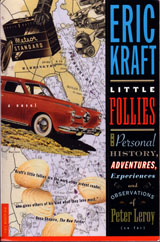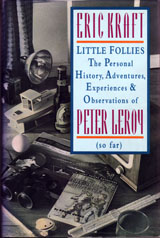
YOU CAN READ THE FIRST HALF
OF THE BOOK HERE,
ONLINE, ONSCREEN.
YOU CAN ORDER THE
PICADOR USA EDITION
AT
AMAZON.COM
OR
BARNES&NOBLE.COM |
|
| The only decent fishing along the Bolotomy is found at a spot known
as Andy Whitley’s Gall Bladder because of Whitley’s fame as an angler and
the spot’s resemblance, on maps and aerial photographs, to a gall bladder.
Boating on the Bolotomy
|
 SHORT WAY UPSTREAM from the pond, the river bulged out oddly on our left,
and there we saw a fellow sitting with his back against a tree, fishing
with a bamboo pole. He wore a battered hat, a dark shirt with the
sleeves rolled above the elbows, and dark trousers, with the cuffs rolled
above his ankles. He had taken his shoes and socks off, and he had
his legs stretched out along the ground so that his feet were in the water.
When we came into sight he raised his hat to us.
SHORT WAY UPSTREAM from the pond, the river bulged out oddly on our left,
and there we saw a fellow sitting with his back against a tree, fishing
with a bamboo pole. He wore a battered hat, a dark shirt with the
sleeves rolled above the elbows, and dark trousers, with the cuffs rolled
above his ankles. He had taken his shoes and socks off, and he had
his legs stretched out along the ground so that his feet were in the water.
When we came into sight he raised his hat to us.
“How d’you do, boys?” he greeted us.
“Very well, thank you,” I answered him, hoping that
he’d ask us where we were headed.
“Where are you headed?” he asked.
“To the source!” I called out proudly.
He considered that for a moment, then asked, “Where
exactly would you say that is?”
“We don’t know,” I sang out, full of glee, standing
up again. I felt the boat rock under me and sat down again quickly.
“But we’re going to find out!”
“A voyage of discovery, eh?” he said. He fished
in his pocket and brought out a pipe, which he filled and lit while we
talked.
“That’s right!” I said. I was grinning from
ear to ear, so proud of Raskol and me for being on this voyage that I couldn’t
contain it.
“And when you find the source of this mighty river,
what exactly would you say that you will have found?”
This question made no sense to me. “What do
you mean?” I asked.
“Well, will you have found the place where the river
begins?” he asked.
“Sure,” I said, wondering to myself how he could
have missed the point of everything I had said so far.
“And I suppose you think that you will have found
something out about life too, when you find the place where you think the
river begins.”
“Well—” I said. I had wanted to say, “Nah,
I don’t expect to learn anything about life from this trip. I just
want to find out where the river begins and eat a few of my favorite meals
along the way and look at the scenery and become famous.” And I wanted
to add, “Please don’t tell me that life is like a river, because I’m sick
of hearing that life is like a river.” However, I had a sneaking
suspicion that he was going to tell me that life is like a river, and I
didn’t want to offend him, so I just let my “Well—” hang in the air and
waited to see what he’d make of it.
“Well what?” he said.
“Well, I don’t know,” I said.
“You don’t know what?” he asked, and I thought that
it was really rather annoying of him to ask such penetrating questions
of a kid, a kid who had just happened to paddle by in a homemade boat,
minding his own business.
“I don’t know if life is like a river,” I said.
He burst out laughing, and Raskol began paddling away.
“No, wait. Wait!” the fellow called.
Raskol stopped paddling. “Why don’t you boys stay and have some lunch
with me? I’m sure I have more than enough for the three of us.
I have ham sandwiches.” Raskol began paddling again, but toward shore.
We beached the boat, and the fisherman pulled about six sandwiches from
a knapsack.
“How come you have so much food?” Raskol asked.
“Because one takes what one can get when one can
get it,” the fisherman answered. “Yesterday I did a little gardening
for a woman, not far from here, and after I finished work a certain lightheadedness
swept over me, and I fell at the good woman’s feet, in what looked a lot
like a faint. After I came to myself again, she dragged from me the
information that I hadn’t eaten in days, and she insisted not only that
she pay me more than we had agreed upon, but that I take this stack of
sandwiches with me.”
“You’re a bum, aren’t you?” asked Raskol.
“Yes,” the fellow said, smiling with what looked
a lot like pride.
He tossed each of us a sandwich, and we began eating.
“So you’re not sure whether life is like a river,”
he said to me. I didn’t know what answer to make, and my mouth was
full, so I just shrugged.
“Well, it’s not,” he said. “Life is like the
whole water cycle. Do you know what that is?”
“You bet,” I said. “We had that last year in science.”
“Ah,” said the fisherman, “but did you have it in
metaphysics?”
“Not yet,” I said. “Maybe we’ll get that next
year.”
“Well, let me give you a jump on the other boys
and girls—”
This is great, I thought. Here I
am out having adventures, and now a real bum is going to tell me something
that the other kids don’t know yet. I’m having the time of my life.
“Since we are here, at this late point in the river’s
course,” he said, “let’s begin here. In that direction, the river
flows on, toward the sea, where it dies. What does it mean to say
that the river dies? It dissipates, it mingles its waters with the
vastness of the sea, it loses its identity, it ceases to exist as a river,
although—” (He drew the word out and pointed his finger into the
air and then waited until Raskol and I were leaning forward to hear what
would come next before going on.) “—although it does not cease to
exist as water. It loses its form, but something of it remains: its
substance. And then it is released from the sea. It evaporates.
Evaporation, boys, is the exaltation of water. It rises, free of
the tug of all that is low and base and mean, and it rises further, leaving
all its dirt and impurities behind. It is purified. It is distilled!
It drifts as tiny particles among other tiny particles. It is water,
but it is not differentiated from the air. It is of the air, but
it is not the air. It has no identity, no self. It is united
with all creation. In this state, it approaches as near as anything
may in these times to the blissful primeval chaos. And then, little
by little, it joins together with its companion particles in clouds.
Clouds. Big, fluffy clouds. What do they look like? Lambs.
Big, fluffy lambs. And from clouds comes what?”
“Rain?” I offered.
“Right,” he said, and I felt pretty proud of myself.
“Rain. And the rain washes over us like what?”
“Like what?” I asked, stalling.
“Yes, like what?” he asked. “Think.
If the clouds are like lambs, then the rain is like what from lambs?”
I reddened. I thought I knew the answer, but
I wasn’t sure how to put it to a grown-up. “Urine?” I whispered.
“Blood!” he shouted. “The rain washes over
us as if it were the blood of lambs. From the old lambs the new lambs
are born, and the blood of the old will become the blood of the new—”
“I’ve heard some of this before,” I tossed in, brightening—but
he kept right on rolling, and I kept quiet.
“Rainwater is the newborn, the reborn, the babe
of the water cycle. It freshens the earth, as each new birth freshens
us, brings hope to all of us stuck here in misery, mud, muck, and mire.
It is a new beginning. It drips from the leaves of the forest.
It washes the city sidewalks. It runs into the mountain rivulet and
the city gutter. It gathers with the runoff from other leaves and
sidewalks, and it becomes what?”
“A flood,” I suggested, pretty sure of myself.
“A stream,” he cried, rolling right on, “the childhood
of a river. And the stream flows on and it picks up dirt and mud
and bits of dead and decaying animals, and it is fouled by sewage and tainted
by young boys who piss into it, just as young boys and girls are tainted
and spoiled by their experiences. And tributaries, other streams,
spill into it and swell it, and what do they stand for?”
I really wanted to get another one right.
“Eating?” I suggested.
“Sexual contact!” he roared. “The bodily oils
that rub off other people. Contact with the world of other bodies,
other odors, other fluids.”
He leaned back against the tree, satisfied with
himself. Raskol and I got up. It was time for us to get going
again.
“Thanks for the sandwiches,” said Raskol.
“Don’t mention it,” said the fisherman.
“And thanks for the conversation,” I added.
He pointed at me with a long and callused finger.
As we shoved off, he said, “You just remember that life is bigger than
a river, and much more complicated. Of all that life is, only a person’s
childhood is anything like a river. For the essence of a river, like
the essence of childhood, is a moving on, from one place to another.
And if the essence of a river is its flowing on, its moving toward a destination,
the essence of the sea is its tidal vacillation, its leaning now this way
and now that way and going nowhere. Although most of childhood is
like a river, a flowing on toward somewhere, toward being grown up, much
of being grown up is like the sea, being tugged this way and that and going
nowhere.”
We pushed the boat into the current, and were swept
a little way downstream before we laid into our paddling, overcame the
seaward motion of the water, and began making progress toward the source
again. When we had gone on upstream for some distance, I heard the
fisherman call out, “And another thing—if this journey of yours is going
to have any metaphoric value at all, you should, I think, be going the
other way.”
|
|
 |




